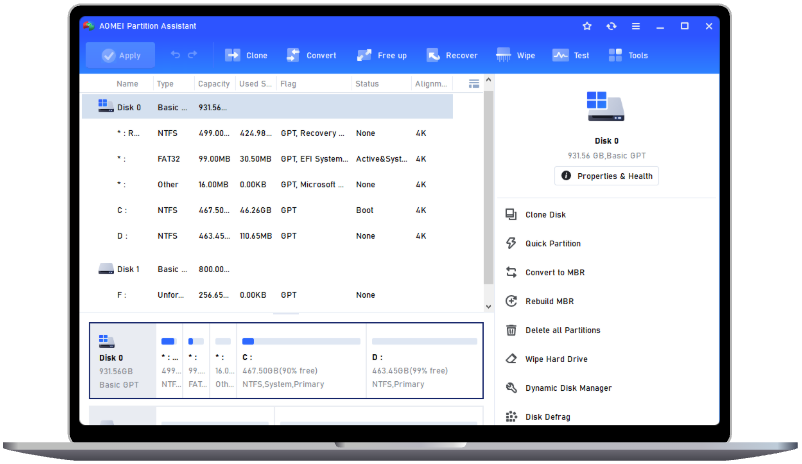What's Causing My Poor Disk Performance [Solutions Included]
Have you ever found yourself wondering the annoying question, “What’s causing my poor disk performance?” In this post, it will identify the top 9 reasons responsible for your slow disk performance as well as offer you valuable solutions to it.
What's causing my poor disk performance?
Have you ever found yourself confused by the gradual degradation of your hard drive's performance in file transfers, read/write operations, or responsiveness? This problem isn't exclusive to aging computers. To correct a slow hard drive, it's important to realize that there are essentially two culprits: software-related issues and hard drive damage.
Once the software or the hard drive itself loses its optimal health, it paves the way for the emergence of undesirable issues such as bad sectors, viruses, fragmentation, and other serious issues. These, in turn, can significantly slow down your system, giving you an annoying user experience.
To better optimize the slow hard drive, let’s figure out what’s causing my poor disk performance:
1. Too many startup programs
By default, many programs start running when your computer starts up unless you actively choose to disable them. However, with the exception of necessary security software, the vast majority of these programs do not necessarily need to be activated immediately after the computer completes the startup process. Therefore, this results in extended startup time.
2. Too many background programs
What many users don't know is that various programs often run discreetly in the background, silently consuming a significant portion of your computer's processing power. The resource consumption of each running program must be scrutinized and those that are unnecessarily judiciously terminated, thereby freeing up valuable processing power.
3. The hard drive is almost full
In fact, performance issues often manifest themselves before the drive reaches full capacity. This is mainly because critical program files that are essential for seamless operation are located on the hard drive. Therefore, as the available storage space gradually decreases, it may cause a noticeable decrease in the speed and responsiveness of the computer.
4. Not enough memory
The need to increase your computer's memory (RAM) may vary depending on the age and pattern of use of your computer. As a rule of thumb, 8GB of RAM is usually enough for most users. However, it's worth noting that specific requirements may vary significantly depending on your specific use case and needs.
5. Processor is overheating
Your processor naturally generates heat during day-to-day operation, which is why your computer has fans - to regulate and dissipate the heat. If your processor starts to overheat, it's crucial to do a thorough inspection. Make sure the fan is unobstructed, confirm it is clear of debris, and verify that it is operating optimally to prevent overheating-related issues.
6. Fragmented hard drive
The process of writing files to free up hard drive space can cause newly saved files to become fragmented. This fragmentation can cause fragments or fragments of files to be scattered in various locations on the hard drive. So when you try to open a file, your processor (CPU) is forced to retrieve all of these individual pieces from different parts of your hard drive. If you find that file access is taking more time than usual, performing disk defragmentation may be a helpful solution.
7. Hardware failure
It is possible that your computer is running slowly because one of your components is failing. Whether it is your hard drive, RAM, CPU, or some other component, there are some cases where you may be able to replace or upgrade. However, it is likely that the best course of action is to buy a new computer.
8. Virus attack
The presence of viruses or malware can seriously affect your computer's performance. If you have antivirus software installed, you must initiate a thorough computer scan to detect and eliminate any potential threats. Additionally, as a precautionary measure, it is recommended to run both a malware scan and a virus scan to ensure complete protection against malware.
9. Software needs to be updated
In your day-to-day activities, you likely use multiple software platforms, so it's crucial to make sure you're running the latest version. If your computer's performance is affected, consider downloading the latest version of Windows and, likewise, updating your web browser of choice to the latest version. Keeping your software up to date is crucial to optimizing your computer's functionality.
How to optimize your disk performance?
After mastering the behind causes, it's time to take some actions to speed up the hard dirve. Proceed to effective methods presented below to learn how to fix slow hard drive Windows 10:
Method 1. Run Disk Cleanup
A large amount of redundant or junk files accumulated on the hard drive would consume valuable hard drive space, causing performance degradation.
To solve this problem, you can use the Disk Cleanup tool, which can effectively identify and remove excess files from your hard drive, thereby optimizing its performance and reclaiming storage space.
Step 1. In the Windows task bar, type "disk cleanup" and press "Enter".
Step 2. In a small window popped, choose C drive and click "OK". Then, tick the files you want to remove and click "OK" in the Disk Cleanup interface.
Method 2. Disable background programs
The reality is that when you close some programs, not all programs actually close. Some continue to run in the background, which can cause high CPU and memory usage. To alleviate this situation, you can utilize Task Manager to kill these delayed processes. Doing so can significantly improve the overall performance of your Windows 10 system.
Step 1. Right-click the taskbar and choose "Task Manager" to open it.
Step 2. Under the Processes tab, you can see which program is biting your memory. Right-click the apps you want to close and select "End task".
Method 3. Defragment your hard drive
For HDD (Hard Disk Drive) in PC, poor performance can indeed be caused by excessive file fragmentation. This is because the hard drive spends a lot of time reading data that is scattered across various locations. To solve this problem, you can consider defragmenting your hard drive, a process achieved through the Defragment and Optimize Drive utility, which is designed to optimize your hard drive by consolidating fragmented data.
Step 1. Press "Windows", input "defragment and optimize drives" on the taskbar, then press "Enter".
Step 2. In the new popped window, choose the target drive and click "Optimize" to defrag it.
Method 4. Upgrade your hard drive
If it is the full storage space that cause your poor disk performance, you can try to free up space, like deleting large files, removing junk files, uninstalling useless programs, and so on. What if these ways don’t work effectively? It is best to upgrade the original hard drive to another larger one or SSD.
For this task, AOMEI Partition Assistant Professional, the best disk cloning software for Windows 11/10/8/7/XP/Vista, can help a lot with the "Clone Disk" feature. It can directly clone the slow HDD to another larger HDD or SSD and transfer everything to the new drive at the same time even with OS on it. Check the steps below to fix a slow hard drive:
Step 1. Install and launch AOMEI Partition Assistant, click "Clone" in the main interface and select "Clone Disk".
Step 2. Choose the hard disk that you need to clone as the source disk and click "Next".
Step 3. Select the destination disk to store the data on the source disk, and then click "Next".
Step 4. Then, you can check the source and destination disk in the next window or change to “Sector to Sector clone”, and click the "Confirm" button to continue if there is no problem.
Here, you can also click the "Settings" button to adjust the partition size on the destination disk or tick "4k alignment" to improve the reading and writing speed of SSD if the target disk is an SSD drive.
Step 5. At last, click "Apply" and "Proceed" in the main interface to start cloning the hard drive.
Conclusion
What's causing my poor disk performance? This article has covered the most comprehensive reasons behind it and gives several valuable solutions. It is worth mentioning that AOMEI Partition Assistant is not a simple disk cloner but also a hard drive speed booster. In addition to cloning disks, you can also use it to extend C dirve, defrag the hard drive, move files from C drive to D drive, and more.


